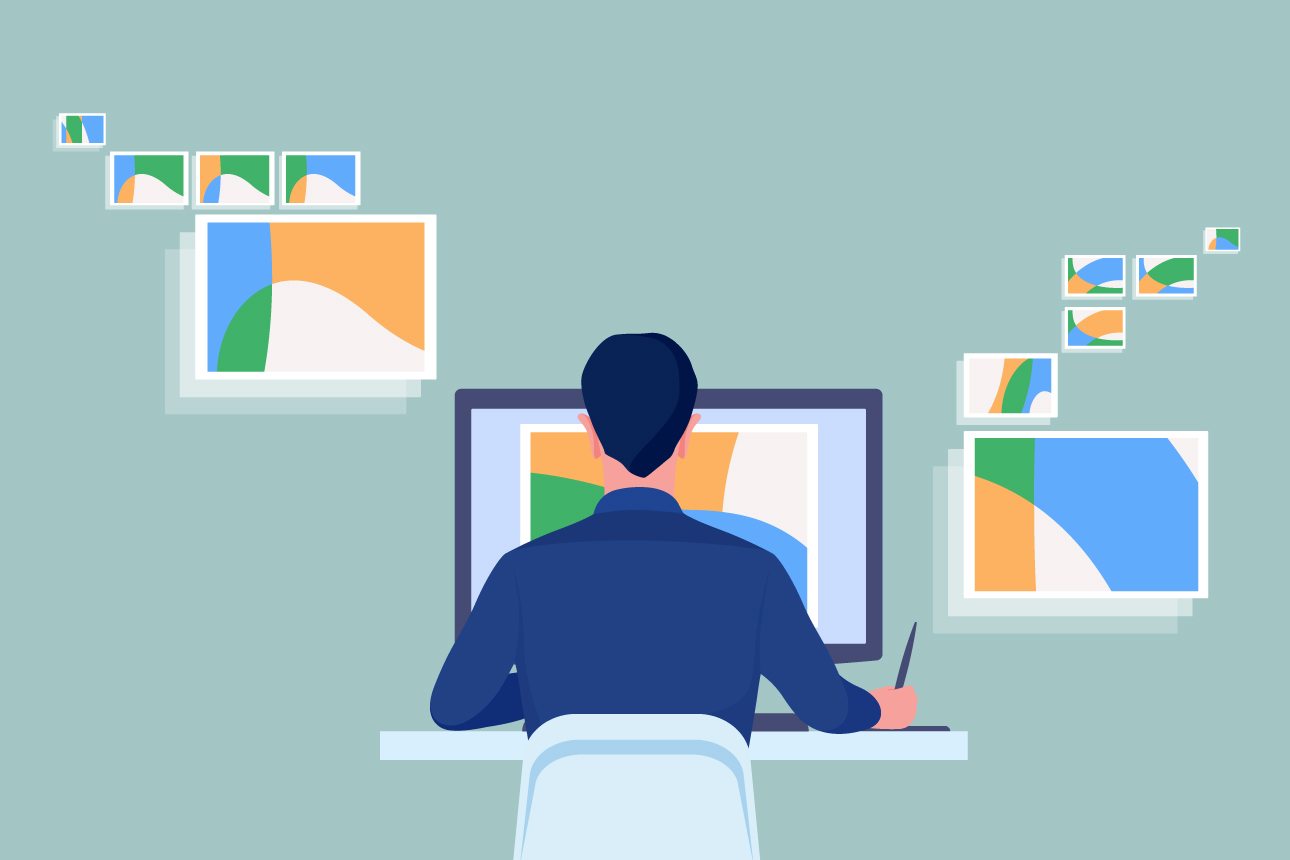How GenAI Changes Creative Work
Artificial intelligence is reshaping creative work and its teams. Leaders must prepare to address these ongoing shifts.

Carolyn Geason-Beissel/MIT SMR | Getty Images
Can AI be creative? While this question often leads to philosophical debates about the meaning of creativity, one fact is clear: Many creative professionals are already using an increasing array of AI tools.1 Art directors, copywriters, and others are harnessing generative AI’s capabilities to generate a large stream of text, imagery, and sound on demand. In one notable example, AI-generated content was selected as the winner in the creative photo category of the Sony World Photography Awards.2
What does this trend mean for the future of creative industries, the leaders who manage creative work in their companies, and their coworkers who make decisions in related areas such as marketing, sales, and legal? Here, we’ll discuss the ways in which AI is affecting this type of work and how creative leaders and their colleagues can prepare for these shifts.
Four Areas Where GenAI Disrupts Creative Work
Through our research and work with companies in this realm, we’ve identified four key changes that are reshaping the nature of creative work in the age of artificial intelligence.
1. Creative Content Supply
The proliferation of generative AI tools is set to substantially increase the creative content supply by enabling high-speed, low-cost production work. Consider the results of a survey of 650 executives: Early adopters of GenAI saved about 11 hours per week in various content marketing tasks, such as brainstorming and refining the design of images, infographics, and other visuals.3 Likewise, creatives are using generative AI to rapidly prototype ideas and test them within minutes.4
One concern is that the AI-enabled surge of creative content comes at the expense of quality. Indeed, there are cases of low-quality or even fraudulent AI-generated content, such as the “copycat” books that already populate Amazon.5 But there is also evidence that AI can provide help, especially for people who lack skills or confidence. For example, a recent study showed that generative AI increased writers’ creativity, with the most pronounced improvements — up to 26% — seen among less-creative ones.6 Overall, while generative AI will significantly increase the quantity of creative content, its effect on quality will be more complex.
References
1. L. Bourton. “Shades of Intelligence: 83% of Creatives Are Already Using Machine Learning Tools — Is Now the Time to Get on Side With AI?” It’s Nice That, Nov. 15, 2023, www.itsnicethat.com; and K. Whiting, “This Is How AI Is Impacting — and Shaping — the Creative Industries, According to Experts at Davos,” World Economic Forum, Feb. 28, 2024, www.weforum.org.
2. A. Parshall, “How This AI Image Won a Major Photography Competition,” Scientific American, April 21, 2023, www.scientificamerican.com.
3. M. Brinker and J. Kelly, “GenAI Powers Content Marketing Advantage for Early Adopters,” PDF file (New York: Deloitte Digital, October 2023), www.deloittedigital.com.
4. B. Holson, “Looking at AI Art Through the Eyes of a Senior Designer,” MadebyAI.xyz, Feb. 8, 2023, https://madebyai.xyz.
5. K. Knibbs, “Scammy AI-Generated Book Rewrites Are Flooding Amazon,” Wired, Jan. 10, 2024, www.wired.com.
6. A.R. Doshi and O. Hauser, “Generative Artificial Intelligence Enhances Individual Creativity but Reduces the Collective Diversity of Novel Content,” Science Advances 10, No. 28, July 12, 2024.
7. Ibid.
8. L. Meincke, E. Mollick, and C. Terwiesch, “Prompting Diverse Ideas: Increasing AI Idea Variance,” working paper, The Wharton School, University of Pennsylvania, Philadelphia, Jan. 27, 2024.
9. “Ogilvy and Wavemaker: #NotJustACadburyAd and Shah Rukh Khan-My-Ad,” WPP, accessed July 10, 2024, www.wpp.com.
10. E. Andes, “Carvana Creates 1.3M+ Unique AI-Generated Videos for Customers,” Carvana 360 (blog), May 9, 2023, https://blog.carvana.com.
11. O.A. Acar, “AI Prompt Engineering Isn’t the Future,” Harvard Business Review, June 6, 2023, https://hbr.org; and O.A. Acar, “Are Your Students Ready for AI?” Harvard Business Publishing, June 15, 2023, https://hbsp.harvard.edu.
12. J. Brand, A. Israeli, and D. Ngwe, “Using LLMs for Market Research,” working paper 23-062, Harvard Business School, Boston, 2023; and P. Li, N. Castelo, Z. Katona, et al., “Frontiers: Determining the Validity of Large Language Models for Automated Perceptual Analysis,” Marketing Science 43, no. 2 (January 2024): 254-266.
13. “After Another Record Year Ahead of Expectations, Publicis Unveils AI Strategy to Lead Group Into Its Second Century,” Publicis Groupe, Jan. 25, 2024, www.publicisgroupe.com.
14. R. DeFrancesco, “Autodesk Infuses Generative AI Across Its Expansive Product Portfolio,” Forbes, March 28, 2024, www.forbes.com.
15. J. Weatherbed, “Music Streaming Platforms Must Pay Artists More, Says EU,” The Verge, Jan. 17, 2024, www.theverge.com.
16. N. Mohan, “Our Principles for Partnering With the Music Industry on AI Technology,” YouTube (blog), Aug. 21, 2023, https://blog.youtube.
17. W. Wright, “Latest Copyright Ruling Should Give Brands Pause for Thought on AI Creativity,” The Drum, Aug. 25, 2023, www.thedrum.com.
